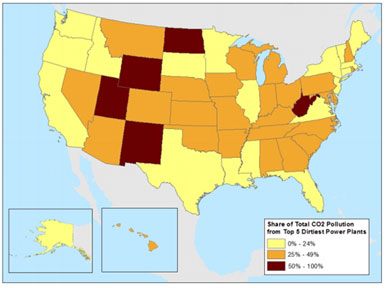Coal will soon be a dirty memory in Oregon, as new legislation sets the state to lead on renewable energy instead.
The Clean Energy and Coal Transition Act, passed yesterday, makes Oregon the first state to officially eliminate electricity from coal-fired power plants.
It doubles the state’s Renewable Portfolio Standard to 50% renewable energy by 2040, putting Oregon on par with just three other states: California, New York and Hawaii.
By 2030, Oregon’s two largest utilities – Portland General Electric and Pacific Power – must no longer import power from out-of-state coal plants, effectively shutting off that energy source. Oregon’s sole coal-fired power plant is slated to close by the end of 2020.
It also directs utilities to develop a strategy that significantly boosts electric vehicle charging stations for cars, trucks and buses – and connects them to the grid.
As usual, many Republicans fought it, claiming electric bills will rise, even though the evidence shows otherwise.
Oregon imports coal from some of the oldest, dirtiest coal plants in the country, in Montana, Utah and Wyoming:
"Oregon’s new clean energy future was charted by unique coalition – not the usual environmentalists vs. utilities, but true consensus: regional and national environmental groups worked with the two largest electric utilities in Oregon and the state’s utility consumer advocate.
"Each had good reasons to support the bill. Environmentalists will get a long-term strategy to clean Oregon’s energy mix. The utilities, which import coal electricity from power plants in Montana, Wyoming, and Utah, gained an assured pathway, allowing them to plan and invest for a stable and affordable power supply," explains Noah Long of NRDC. "Meanwhile, the consumer advocate, Citizens’ Utility Board, was able to ensure that Oregon customers would not have to pay to keep aging coal plants puffing and sputtering along indefinitely."
Coal currently supplies a third of Oregon’s power, and if this legislation didn’t pass, it would have been on the ballot in 2016.
Last month, Oregon joined 16 states to make a clean energy future a reality under the "Governors’ Accord for a New Energy Future."
In New York, Governor Cuomo wants to eliminate coal use by 2020, but it has yet to be officially passed into law.
Portland Blocks Fossil Infrastructure
Last year, the City of Portland passed a landmark resolution that prevents new fossil infrastructure, in the toughest fossil fuel export policy in the US.
It directs staff to propose modified codes that prevent coal, gas or oil from being transported or stored within city limits or waterways.
Portland (and Seattle) – among the cleanest cities in the US – suddenly find themselves in the cross-hairs as the fossil industry tries to turn the Northwest into a export hub for tar sands oil, coal and fracked gas.
Read our article, More Energy Efficiency Is All the Northwest Needs for 20 Years Of Electricity.
